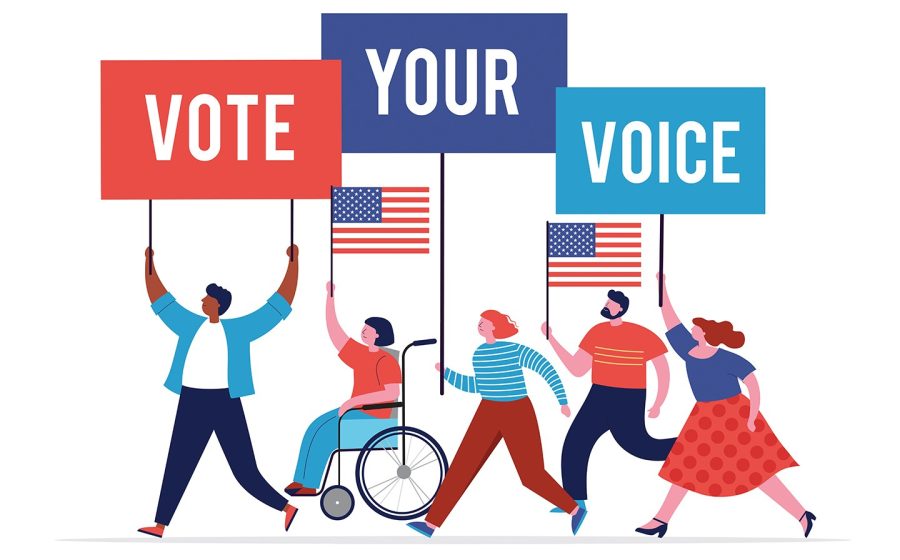Why are Americans so uninterested in politics?
February 24, 2022
The other day in my English class, we began to talk about the country’s low voter turnout. My teacher raised a very interesting point during the discussion: although our country appears to be more politically polarized than ever, statistics show that the majority of Americans are indifferent towards politics. This figure surprised me at first, but over the past few days, I have created somewhat of a hypothesis that may explain this phenomenon.
I believe that the reason why Americans aren’t involved in politics or voting is due to faults present in almost all politicians. There are three main issues that both parties are guilty of perpetuating:
1. Career Politicians
Over the past decade or so, it feels as if the government has become less and less in touch with the public. Now, obviously the age requirements for Congress and the President have some merit—it would be unwise to give an inexperienced eighteen-year-old the power of the presidency. However, the opposite outcome is also just as frightening. The government is currently full of “career politicians” that have been in control for decades thanks to the absence of term limits in Congress. It’s only logical for the public to begin to question whether these sixty-, seventy-, and eighty-year-old congresspeople have the capacity to decide on the nation’s public policies. It wouldn’t take long to find countless representatives and former presidents on both sides of the aisle that appear physically or mentally unfit to serve. Furthermore, even if some of these politicians do happen to still be fit to serve, when the average American citizen keeps seeing the same people run for election over and over again, it might be easy for them to become disillusioned and lose interest.
2. Congressmen Investing
The salary for a senator or representative is $174,000. This is certainly nothing to scoff at, but how is it that the net worth of these politicians increases by millions during their time in office? The answer is through a tactic known as insider trading. Although technically illegal, senators and representatives have access to classified information about the economy, which is necessary in order for them to create beneficial economic policies. However, this also gives them a MASSIVE advantage when it comes to the stock market, as they know how certain companies will be affected by their legislation. For example, Congress could be working on a bill that will cause a dramatic short term increase in Tesla’s stock value. Once the bill gets passed, senators and representatives will quickly invest all of their money in Tesla and get a huge return on their investment. The same principle works in reverse as well. Right before the pandemic caused the economy to tank in 2020, many congresspeople pulled all of their money out of the stock market because they knew that it was about to crash. There has been legislation passed to prevent senators and representatives themselves from investing, but they’ve gotten around these laws by simply giving money to their family members and having them invest it instead (so that the money isn’t technically under the congressperson’s name). Insider trading brings a huge special interest into the job of a congressperson and can potentially sway their policy decisions for the worse.
3. “Campaign Donations”
As the scale of elections has increased, the ability to run for governmental positions has become more gated to the “common man”. In order to pay for campaign expenses and political ads, you either need to be insanely rich or have the backing of insanely rich people. Unfortunately, this leads to another conflict of interest. If big companies are providing all of the funding for an individual’s campaign, then they will naturally expect “political favors” in return. They could say, “Hey, we’ll give you X amount of money as long as you vote in a certain way on specific bills”. It’s not that they completely control these politicians, but they definitely have a degree of influence. Sadly, this applies to the presidency as well. If you compare the net worths of modern presidents before and after they took office, you’ll find that they often increase by tens of millions of dollars. The leading reasoning behind this is that once again, companies can use their “influence” to get presidents to make certain decisions while in office. Once they leave office, these companies will reward the ex-presidents by paying them millions of dollars for doing menial tasks like giving speeches or writing memoirs. On top of the personal interests involved in congresspeople investing, campaign donations bring in outside interests to further affect the actions of politicians.
In summary, I believe that the general public’s current view of American politicians is vastly unfavorable. They are still seen as “old, corrupt white men,” which is why nobody cares enough about them to go out and vote.


